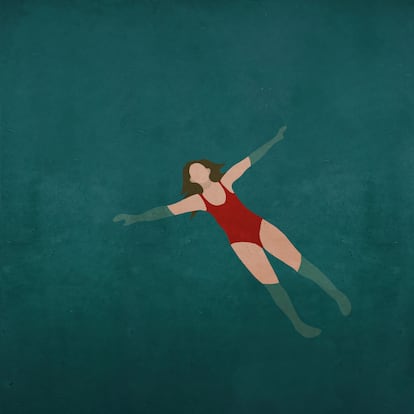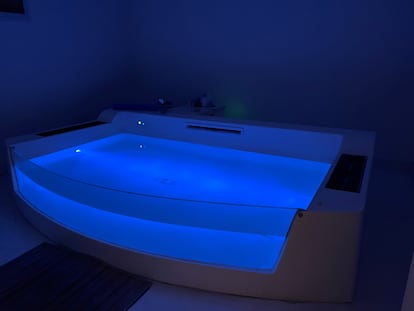Silence as a luxury: How an increasingly loud world turned something free into a commodity
Our hectic, busy lives, along with the constant noise and distraction of technology, make us look for solace in an almost utopian notion of disconnection. Silent meditation centers and sensory deprivation tanks are two options that can provide respite

On the fifth floor of number 25 on the bustling Princesa street, in the center of Madrid, you’ll find Más que Silencio (More than Silence), a wide, practically empty space with large windows, open to anyone who wishes to disconnect from the noise of the city. There, they offer classes to introduce people to silent meditation; others go freely to experience silence with their own tools. There is no registration fee or sign-up requirements. What’s more, the classes do not have a fixed price; it varies depending on what each person can contribute, so that anyone can afford the experience.
Elena Hernández and María Sánchez work as volunteers in this urban refuge that was born from an increasing demand. “The project arose from a need for silence that we noticed around us as a consequence of the amount of stimuli that we face every day. We wanted to offer an oasis in the middle of the city to rest from those noises, to work on inner silence and thus facilitate outer silence,” Hernández explains to EL PAÍS. It is no longer just a matter of getting away from the auditory stimuli that make up the soundtrack of any city, but also from the sensory ones, or new generation noises, like the sound of WhatsApp conversations, personal or work email alerts, or the constant intrusion of social media notifications. “Without silence, we lose freedom,” she adds. “We live in a state of continuous distraction, responding to constant stimuli that we don’t know how to stop. In order to take control of your life and live it fully, you must allow yourself spaces where you can listen to yourself.”
Since Más que Silencio opened its doors 15 years ago, at least five similar centers have appeared in Madrid. A decade ago, no one knew exactly what mindfulness was; today, meditation classes and silent retreats abound, references to the Zen discipline can be found anywhere, and people, looking to disconnect, seclude themselves in monasteries on their vacations, perhaps seeking the path of the mystics. Technology, too, seeks to become an ally of stillness: in 2019, Apple launched the AirPods Pro, for the first time offering noise cancellation, which became one of its most popular features. In 2021, Netflix released a meditation guide called Headspace which became a hit, and on Spotify you can find meditation and white noise playlists and podcasts with more followers than many artists. Silence – or the absence of noise – has become a valuable commodity, a luxury item in an increasingly fast-paced society where haste has become a lifestyle.

In his posthumous and incomplete essay Pensées (Thoughts), mathematician, physicist and philosopher Blaise Pascal wrote one of his most famous sentences: “All of humanity’s problems stem from man’s inability to sit quietly in a room alone.” The text was published in 1670, but it is imbued with such foresight that it made Pascal, in pandemic times, the intellectual symbol of staying at home. He did not experience the growth of large cities, the contraction of the spaces we inhabit to almost uninhabitable limits or the arrival of the radio, the television and, finally, the internet. Pascal would have never imagined that sitting quietly in a room with a smartphone in one hand would no longer be synonymous with being truly alone.
In a post entitled “Why It’s OK to Block Ads,” on the University of Oxford’s Practical Ethics blog, the technology ethicist James Williams states: “We experience the externalities of the attention economy in little drips, so we tend to describe them with words of mild bemusement like ‘annoying’ or ‘distracting.’ But this is a grave misreading of their nature. In the short term, distractions can keep us from doing the things we want to do. In the longer term, however, they can accumulate and keep us from living the lives we want to live, or, even worse, undermine our capacities for reflection and self-regulation.”
Sitting quietly in a room alone

In the United States, the use of sensory deprivation tanks is so widespread that it appears frequently in popular culture: in The Simpsons, Homer and Lisa have an astral journey in them, and in the series Stranger Things, Eleven also uses one. It was invented in 1954 by neuroscientist John C. Lilly while working for the US government: an enclosed saline bath designed for the intensive study of human consciousness when deprived of as much external stimuli as possible. Lilly, who would later experiment with altered states of consciousness enhanced by drugs such as LSD and ketamine, had time travel or the exploration of alternate realities in mind when he created the device, but it turned out to be perfect for relaxation.
“Floating in a high-density saline solution has proven physical benefits: it improves muscle tension thanks to the weightlessness, elongates the spine, increases blood flow and reduces the production of cortisol, lactic acid and adrenaline,” explains David Murcia, owner of Flotexperience, a center that specializes in flotation experiences in Madrid. “Mentally, depending on each person’s ability to let go at that moment, one can reach different levels of depth or self-awareness.”
The kinds of urban disconnections that we are used to are nothing like this floating isolation: “When it comes to disconnecting,” explains Murcia, “people try to fill the empty space with another activity: binge-watching series, whole afternoons refreshing their social media feeds, shopping, eating. It’s noise over noise. Perhaps we should ask ourselves whether those are healthy forms of evasion or new addictions.”
Murcia takes the journalist to her float tank, which is more like a small pool set up in a dark room. To make it suitable for claustrophobics, it does not have a lid. The experience can be more or less intense: one can play with the lights or stay in the dark and do it in absolute silence or be enveloped by white and ambient sounds. Other than that, you float. Perhaps a sensory deprivation tank is the best thing that this millennial can find to be quietly in a room alone, as Pascal longed for.
The floating experience lets you go into a vigil-like state that, together with a loss of proprioception, also favors a temporary disconnection, to the point of losing track of time and not knowing if you have been floating for 20 minutes or several hours. Perhaps one of the most extreme experiences that any hectic urban dweller can face in a world that never takes a break is stopping and floating, listening only to the sound of the water and one’s own thoughts, which take a while to disconnect from a lifetime of noise.
Leaving the small pool to return to the city, one can understand why some say that silence is a privilege. You can’t help but notice how annoying the world around you is. With a brain that is as relaxed as your muscles, it is easier to be bothered by a horn or seven unanswered WhatsApp messages. Perhaps the great discovery of this floating session is that, to experience silence, first you have to become aware of the noise.
Tu suscripción se está usando en otro dispositivo
¿Quieres añadir otro usuario a tu suscripción?
Si continúas leyendo en este dispositivo, no se podrá leer en el otro.
FlechaTu suscripción se está usando en otro dispositivo y solo puedes acceder a EL PAÍS desde un dispositivo a la vez.
Si quieres compartir tu cuenta, cambia tu suscripción a la modalidad Premium, así podrás añadir otro usuario. Cada uno accederá con su propia cuenta de email, lo que os permitirá personalizar vuestra experiencia en EL PAÍS.
¿Tienes una suscripción de empresa? Accede aquí para contratar más cuentas.
En el caso de no saber quién está usando tu cuenta, te recomendamos cambiar tu contraseña aquí.
Si decides continuar compartiendo tu cuenta, este mensaje se mostrará en tu dispositivo y en el de la otra persona que está usando tu cuenta de forma indefinida, afectando a tu experiencia de lectura. Puedes consultar aquí los términos y condiciones de la suscripción digital.









































